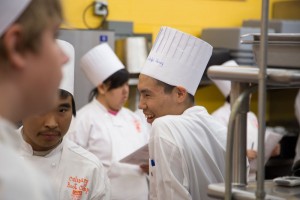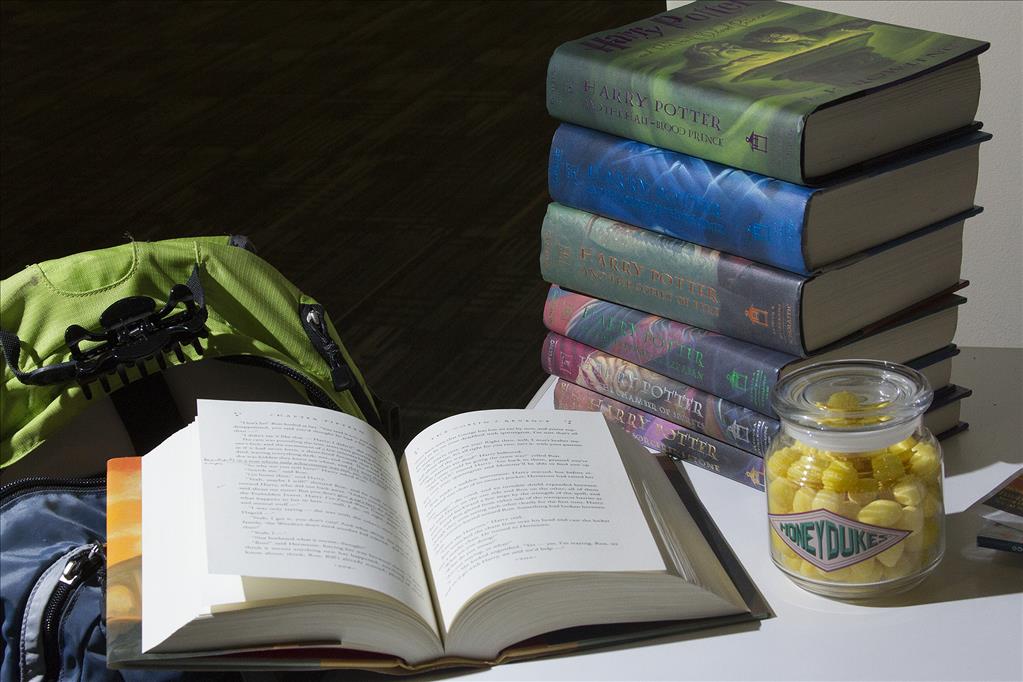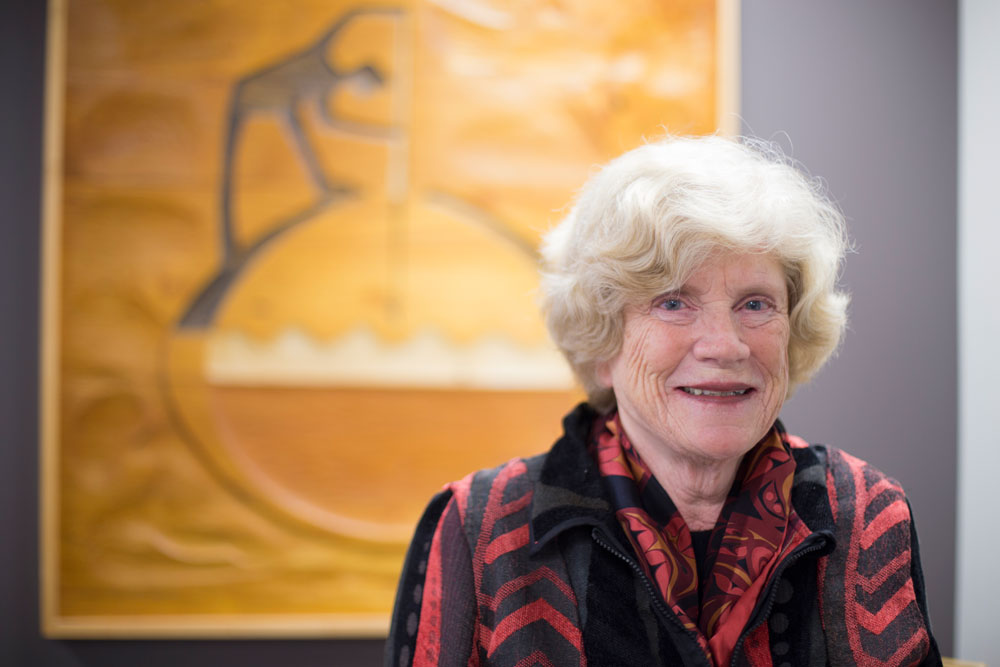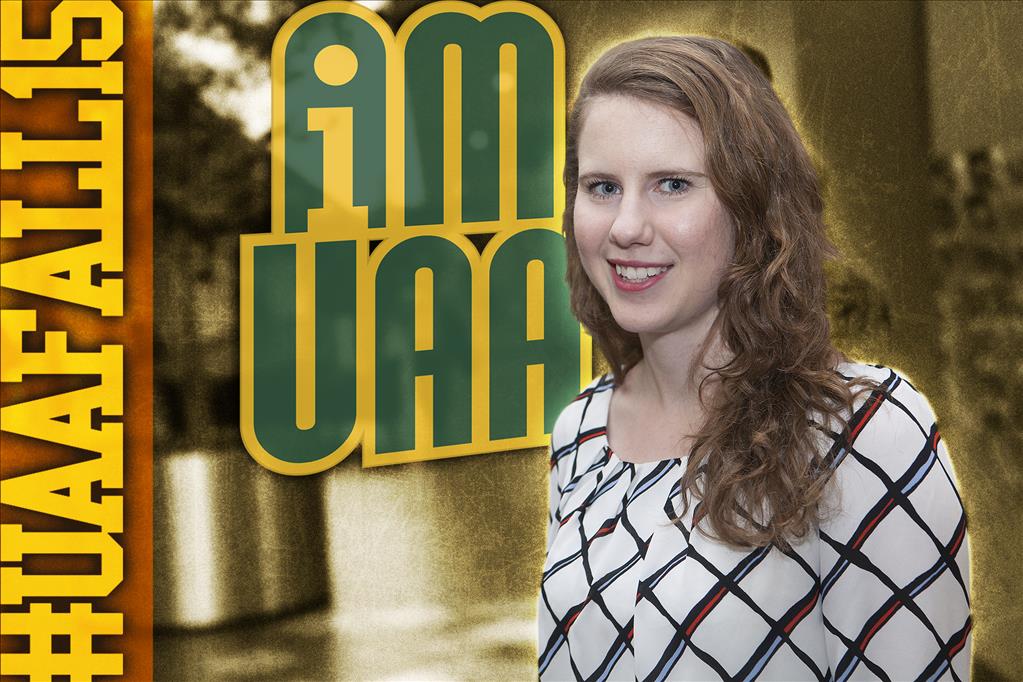Culinary Boot Camp: It's all about technique and stamina
by Kathleen McCoy |

Chef and professor Tim Doebler demonstrated proper knife technique during a summer culinary boot camp. A cohort of students mostly from the Lower Kuskokwim School District observe. (Photos by Ted Kincaid/University of Alaska Anchorage, unless otherwise noted)
The night before they flew from Bethel to Anchorage for a one-week intensive cooking camp at UAA, 10 high schoolers from rural southwestern Alaska watched episodes of "Chopped" on Netflix.
The reality-based cooking show pits four chefs against each other, challenged to create a dish with "mystery" ingredients. That wasn't exactly the agenda for their boot camp at UAA, but it offered insight into work life in the kitchen.
"They thought it would be easy to create these dishes," said chaperone and education specialist Chip Abolafia, "but at camp they learned it's hard work and it takes a lot of stamina."

Doebler with another kitchen technique as practiced by the best. Here, Mary Augustine, age 16 and a sophomore from Kwethluk, third from right, and Adolph Henry Jr., age 18 and a senior from Eek, far left, take it all in.
Acquiring kitchen skills was one goal for the students who came from small village schools along the Kuskokwim River, places like Eek, Kwethluk, Chefornak and Kongiganak, but also from the regional high school in Bethel. All are affiliated with the Lower Kuskokwim School District (LKSD).
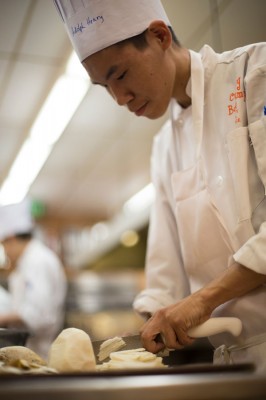
Like the masters, Adolph Henry Jr. practices knife technique. He came to camp because he usually cooks for the family when his mother is away; he wants to improve.
The culinary boot camp delivered real-time practice in spades. High on the list was effective and safe knife techniques, sanitation before cooking, use of fresh ingredients (not easy to find in rural areas) and nutrition. Each student was outfitted in chef whites and cap. Culinary Boot Camp scrawled in red thread on their crisp white jackets; they wrote their own names in pen and pencil on tall white paper toques. (Take a quick peek as the students work in this 90-second video shot right in the kitchens at UAA.)
Save those thumbs
As they practiced new chopping techniques, the teacher had them laughing about their misbehaving thumbs, Chip remembered. "The chef said, 'If you don't start moving your thumb, I'll save you the trouble and cut it off right now.'"
They laughed, and adapted. Mary Augustine, 16, a sophomore from Kwethluk, said one idea they jokingly considered was "duct-taping" their thumb safely out of the way. "We learned you can't hold the knife with your fingers sticking out," she said. "But once we started practicing, we've been getting better at it every day."
This was the second time LKSD had sent students to UAA's Culinary Boot Camp. A year ago, a $5,000 grant from Donlin Gold, an Alaska mining company, sent the first campers. It was such a success that the district decided to repeat the opportunity this year, using district funds.
The camp was a huge hit among the teens. "We had more than 60 students apply the second year," Chip said. "Whether or not we can do it again next year depends,' he said, with so many current and pending budgetary cutbacks.
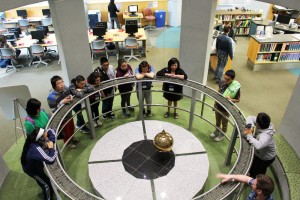
Mornings during the culinary boot camp were spent touring UAA, APU, Job Corps and the Alaska Career College. (Photo by Chip Abolafia/LKSD, used with permission)
Beyond the kitchen experience, the trip into Anchorage has other ambitious goals. Each morning, the teens visited academic and vocational opportunities that could be a path in their future, from full tours of UAA and APU, to visits to the Job Corps facilities in Palmer and Alaska Career College in Anchorage. Evenings were spent dining at Anchorage restaurants that featured unique cuisines, from Mexican to Southern BBQ to Vietnamese.
Learning new foods
"For these kids, comfort food is bird stew," said Chip. "Now, they can find out what comfort food is in Mexico or Vietnam. And they can learn why meat is barbecued, as a way to tenderize cheaper cuts."
One student ordered Vietnamese pancakes "and ate every one," Chip recalled; another was surprised and amazed at a sizzling plate of fajitas that she ordered and enjoyed.
They also sampled pizza at Moose's Tooth, and stopped in at Great Harvest Bread Company, where the owner took them behind the scenes. So did chefs at Turnagain Arm Pit BBQ.
Big city exposure was another goal, Chip said.
"The pace in Anchorage is very different from home," he said. "Just stop at Fred Meyer for shampoo, and you're looking at an aisle 30 yards long, filled just with shampoo. It's overwhelming."

Among their big-city adventures, the rural cohort climbed Flat Top and floated H2Oasis. (Photo by Chip Abolafia/LKSD, used with permission)
The trip included a hike up Flat Top and pool time at H2Oasis; the whole crew took in "Pitch Perfect 2" at the movies.
Said Chip of the role he and a fellow chaperone Sharon Wegner played, "When we have the opportunity to take these kids to this institute, we want to provide a once-in-a-lifetime memory, a forever opportunity. Something that will give them hope to graduate and choose a path appropriate for themselves."
The lessons were taking.
Meet Adolph, from Eek
Adolf Henry, Jr., 18, will be a senior next year at the school in Eek, a village that is home to about 300 residents. He expects to graduate in a class of four. In his application to the culinary boot camp, he said he wanted to do a better job of "cooking for my father." As the youngest in the family, he often cooks-soups and fried dishes, he said-for everyone else when his mom is away.
But he also relished the chance to see a college campus; he has a cousin attending UAA in the fall. Adolf is considering psychology himself: "I want to help people who need help," he says simply, with a shy smile.
He said he didn't get homesick, but found the residence halls a tough go. "It was hot in there; I always had my window open." His favorite dish for the week was rigatoni, with noodles and meatballs. He didn't care all that much for the tamale pie. "I just don't like some foods," he said. "We're mostly used to Native food, what we eat at home."
He'd befriended Mary Augustine, the sophomore from Kwethluk, on the very first day of camp. "He's very quiet," Mary said, "and I like to talk. I just started talking to him about this school, and my friends and family."
Meet Mary, from Kwethluk
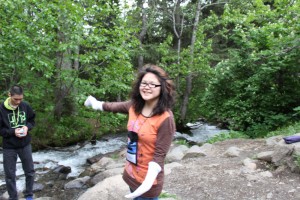
As usual, Mary is all smiles. Here she's with the LKSD cohort visiting an Anchorage outdoor setting. (Photo by Chip Abolafia/LKSD, used with permission)
Unlike Adolph, she loved the tamale pie. In fact, you'd be hard-pressed to find anything Mary doesn't like. Her favorite subjects in school, she said, are "math, science and economics."
She'd also traveled a bit more than Adolph, to Sitka, Wrangell, Juneau, Palmer and even to Canada for a hiking trip along the Stikine River.
She said her mother has told her she can do anything she wants in the world. "Whenever I think about my future," Mary said, "I say I am going to meet a lot of people and make a lot of friends. I can do it. I give myself the confidence."
Her focus and purpose are real. Chip says her peers from the LKSD are full of promise.
'They show up...and try hard'
"Our kids are amazing," Chip said. "They may face challenges, but they are very down to earth and not a lot fazes them.
"They may have to chip ice in the river just to get some drinking water. They help out their elders and parents. They take care of their grandparents and their siblings. They show up every single day and try really hard."
Learning kitchen skills was one goal of the Anchorage experience; another was aspirational. One applicant wrote in an essay that she'd like to return home and open a bakery. And while regional hub Bethel has several restaurants, most villages are too small to support them. But students with better cooking skills can use them at a common rural activity-community fundraisers.
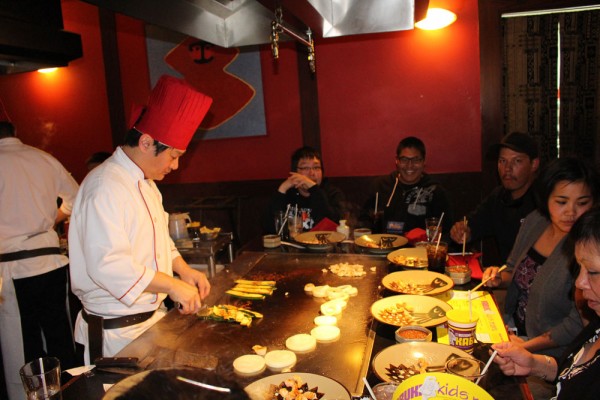
The LKSD cohort watched the excellent knife technique and cooking styles of chefs at Benihana. (Photo by Chip Abolafia/LKSD, used with permission)
Last hurrah
Their final big-city surprise was a trip to the hibachi-style Japanese steakhouse, Benihana. There, the knife techniques they'd been studying all week were on amazing display as talented chefs sliced and diced meat and vegetables right before their very eyes.
Who knows? Maybe a culinary boot camp grad has a future as a Benihana table-side chef? Or perhaps we'll even see one compete one day on "Chopped"?
We do know this: They'll arrive with both thumbs and some topnotch knife techniques, thanks to their week in the kitchens at UAA.
Written by Kathleen McCoy, Office of University Advancement
 "Culinary Boot Camp: It's all about technique and stamina" is licensed under a Creative Commons Attribution-NonCommercial 4.0 International License.
"Culinary Boot Camp: It's all about technique and stamina" is licensed under a Creative Commons Attribution-NonCommercial 4.0 International License.











